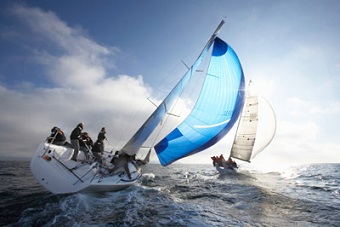Sailing skills are developed over time and are ultimately improved with experience – requiring a great deal of time, dedication and training.
Preparation for races can take several forms, from basic training and development to specific course reading and planning.
Boating courses can aid in this preparation by developing essential skills, leaving a sailor safe in the knowledge that they have what it takes to compete.
While gaining the cutting edge over an opponent, it’s also important to ensure that the safety of both yourself and others is taken into account.

This means that risky manoeuvres and dangerous tactics should not be employed in conditions where such actions could represent a risk.
Even if those racing have taken the necessary first aid courses and survival practice, the water can still pose a threat to even the most experienced of sailors.
These courses do provide the skills required to deal with any emergency incidents, but it is always preferable if these instances can be avoided in the first place.
Additional courses can help to develop knowledge of different vessels to make the overall sailing experience a lot more enjoyable.
Day skipper sailing courses provide the additional knowledge to manage a vessel and the focus on decision-making skills will certainly be of use when competing.
Other theory courses will also provide additional guidance on how best to race, while practical sailing lessons can work on the various technical aspects that can help a sailor to gain an advantage.
In an effort to go as fast as possible there are always associated risks, but it is the understanding and careful management of these risks that helps to keep sailing safe.
These types of courses will provide the basic information relating to sailing in regular conditions during the day and any other further development will come with experience.
A key factor in becoming a competitive sailor revolves around time – it takes time to complete the necessary training, while it also takes time to build up enough experience.
While it is possible for a new sailor to pick things up very quickly, it is likely that some small technical aspects can always be improved – similar to sportsmen in virtually every other sport.
Strength and conditioning play a vital part in race preparations, as a sailor’s body will be placed under pressure during the race.
Legs, arms and abs will face strain at some point, so it’s important to train hard both in the gym and on the water.
This will not necessarily be covered on training courses, but when learning to sail it will quickly become evident which sort of training exercises will need to be undertaken.
Lunges, crunches and weight work will all improve a sailor’s physique and will ease the pressures placed on their body when racing.
One thing that a training course will show, however, is the correct techniques required for manoeuvres – meaning that any related pain will usually mean it’s not being done correctly.
Different training will often exist for the many different vessels that can be used, with yachting being a vastly different experience to time spent in a regular sailing boat.
As a result, yachtmaster training courses could be useful for those considering racing in that specific type of vessel.
Techniques will vary by the boat concerned and it’s always important to be comfortable in a particular vessel before racing.
Essentially, boating courses help with the development of a sailor and will provide the necessary skills and guidance required to make highly competitive individuals.
Those considering competitive racing are encouraged to train for a considerable time period beforehand, in order to develop the necessary skills to succeed.
Good Article, we agree a good mixture of sailing knowledge, but also some tactics training would be good! Miramar Sailing will soon be offering a Race training Clinic based in Antigua – so the perfect introduction to the Caribbean regatta schedule for those interested!